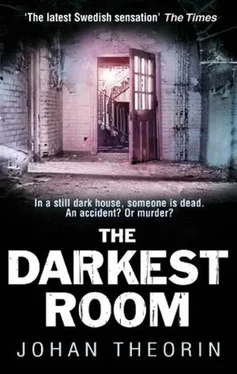Westin hardly seemed to be listening. He was studying his hands as Holmblad stopped speaking, then he asked, “How’s the investigation going?”
“The investigation?”
“The police investigation. Into my wife’s death.”
“There is no investigation,” said the inspector quickly. “We carry out investigations or preliminary investigations only when a crime is suspected, and in this case there are no grounds for suspicion.”
Westin looked up from the table. “So what happened was nothing out of the ordinary?”
“Well, of course it wasn’t exactly normal,” said Holmblad, “but…”
Westin took a deep breath and continued: “My wife said goodbye to me outside the house that morning. Then she went inside and scraped windows. Then she made herself some lunch, and after that she went down to the shore. And then she walked right to the end of the jetty and jumped into the water. Does that seem normal to you?”
“Nobody’s saying it was suicide,” said Holmblad. “But as I said, there are no grounds to suspect any kind of crime. For example, if she’d had a couple of glasses of wine with her lunch and then walked along stones that were slippery…”
“Do you see any bottles around here?” Westin interrupted him.
Tilda looked around. There were in fact no bottles of wine in the kitchen.
“Katrine didn’t drink,” Westin went on. “She didn’t drink alcohol. You could have checked that out with a blood test.”
“Yes, but…”
“I don’t drink either. There is no alcohol here at all.”
“May I ask why?” said Holmblad. “Are you religious?”
Joakim looked at him, as if the questions were insolent. And perhaps they were, thought Tilda.
“We have seen what drink and drugs can do,” he said eventually. “We don’t want that kind of stuff in our house.”
“I understand,” said Holmblad.
There was silence in the big kitchen. Tilda looked out of the window toward the lighthouses and the sea. She thought about Gerlof, about his constant curiosity.
“Did your wife have any enemies?” she asked suddenly.
From the corner of her eye Tilda could see Holmblad looking at her as if she had suddenly appeared out of nowhere at the kitchen table.
Joakim Westin also seemed surprised by the question. Not annoyed, just surprised.
“No,” he said. “Neither of us has any enemies.”
But Tilda thought he seemed hesitant, as if there were more to say.
“So she hadn’t been threatened by anyone here on the island?”
Westin shook his head. “Not as far as I know… Katrine has been living here alone with the children over the past few months. I’ve only come down from Stockholm on the weekends. But she hasn’t mentioned anything like that.”
“So she seemed perfectly normal before she died?”
“More or less,” said Joakim Westin, looking down into his coffee cup. “A bit tired and low, maybe… Katrine was finding it quite hard to be alone while I was working in Stockholm.”
Silence fell again.
“May I use your bathroom?” said Tilda.
Westin nodded. “Out through the porch and it’s to the right along the corridor.”
Tilda left the kitchen. She found her way easily; after all, she had been in the house before.
The smell of paint had almost gone from the porch and corridors now, and the house felt a little more lived in.
In the corridor leading to the bedrooms a painting had been hung up recently. It was an oil painting depicting a grayish-white landscape-it looked like northern Öland in the winter. A snowstorm was swirling over the island, blurring all the contours. Tilda couldn’t remember having seen the island depicted in such a dark, forbidding way before, and remained standing in front of the picture for a while before she went on to the bathroom.
It was small but warm, tiled from floor to ceiling, with a thick blue rug on the floor and an old-fashioned bathtub standing on four lion’s paws made of cast iron. When she had finished, she went back into the corridor and past the closed doors leading to the children’s rooms. She stopped at the next bedroom along; the door was half open.
A quick look?
Tilda poked her head in and glimpsed a small room with a big double bed. There was a small bureau next to the bed, with a framed photograph of Katrine Westin, waving from a window.
Then Tilda saw the clothes.
A dozen or so hangers with women’s clothes on them were hung around the bedroom walls like pictures. Sweaters, pants, tops, blouses.
The double bed had been neatly made, and a white nightgown lay tidily folded on one pillow-as if it had been placed there in the expectation that the woman who owned it would come and put it on when darkness fell.
Tilda looked at the strange collection of clothes for a long time, then backed out of the bedroom.
On the way back to the kitchen she heard the inspector’s voice:
“Well, time we were getting back to our duties.”
Göte Holmblad had finished his coffee and got up from the table.
The atmosphere in the room seemed less tense now. Joakim Westin stood up and glanced briefly at both Tilda and Holmblad.
“Fine,” he said. “Thank you for coming.”
“No problem,” said Holmblad, and added, “Of course you are at liberty to pursue this matter, I want you to know that, but of course we would very much appreciate it if…”
Westin shook his head. “I won’t be taking it any further…
It’s over.”
He accompanied them into the hallway. Out on the steps he shook hands with both officers.
“Thanks for the coffee,” said Tilda.
Dusk had fallen, and there was a smell of burning leaves in the air. Down by the shore the lighthouse was flashing.
“Our constant companion,” said Westin, nodding toward the light.
“Do you have to take care of the lighthouses in any way?” asked Holmblad.
“No, they’re automated.”
“I heard the stones they used to build them were taken from an old abandoned chapel,” said Tilda, pointing toward the forest in the north. “It was somewhere down by the point.”
It felt as if she were showing off and trying to play the tourist guide, but Westin was actually listening.
“Who told you that?”
“Gerlof,” said Tilda, and explained: “He’s my grandfather’s brother over in Marnäs; he knows quite a bit about Eel Point. If you want to know more, I can ask him…”
“Sure,” said Westin. “Tell him he’s welcome to come over for coffee sometime.”
***
When they were back in the car, Tilda looked over at the big house. She thought about all those silent rooms. Then she thought about the clothes hanging on the walls in the bedroom.
“He’s not feeling too good,” she said.
“Of course he isn’t,” said Holmblad. “He’s grieving, after all.”
“I wonder how the children are doing?”
“Small children forget pretty quickly,” said Holmblad.
He pulled out onto the coast road heading for Marnäs and glanced over at Tilda.
“Those questions you asked in the kitchen were a little… unexpected, Davidsson. Did you have something in particular in mind?”
“No… it was really just a way of making contact with him.”
“Well, maybe it worked.”
“We could probably have asked him a lot more.”
“Oh?”
“I think he had things to tell us.”
“About what?”
“I don’t know,” said Tilda. “Maybe… family secrets.”
“Everybody has secrets,” said Holmblad. “Suicide or accident? That’s the question… but it’s not our job to investigate.”
“But we could look for traces,” said Tilda, “quite impartially.”
“Traces of what?”
Читать дальше










